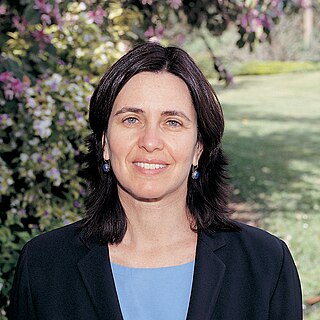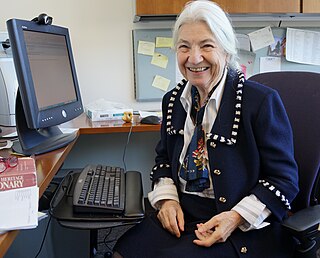
Shafrira Goldwasser is an Israeli-American computer scientist and winner of the Turing Award in 2012. She is the RSA Professor of Electrical Engineering and Computer Science at Massachusetts Institute of Technology; a professor of mathematical sciences at the Weizmann Institute of Science, Israel; the director of the Simons Institute for the Theory of Computing at the University of California, Berkeley; and co-founder and chief scientist of Duality Technologies.

Barbara Liskov is an American computer scientist who has made pioneering contributions to programming languages and distributed computing. Her notable work includes the introduction of abstract data types and the accompanying principle of data abstraction, along with the Liskov substitution principle, which applies these ideas to object-oriented programming, subtyping, and inheritance. Her work was recognized with the 2008 Turing Award, the highest distinction in computer science.

The President's Council of Advisors on Science and Technology (PCAST) is a council, chartered in each administration with a broad mandate to advise the president of the United States on science and technology. The current PCAST was established by Executive Order 13226 on September 30, 2001, by George W. Bush, was re-chartered by Barack Obama's April 21, 2010, Executive Order 13539, by Donald Trump's October 22, 2019, Executive Order 13895, and by Joe Biden's February 1, 2021, Executive Order 14007.
Elaine Jessica Weyuker is an ACM Fellow, an IEEE Fellow, and an AT&T Fellow at Bell Labs for research in software metrics and testing as well as elected to the National Academy of Engineering. She is the author of over 130 papers in journals and refereed conference proceedings.

Manuela Maria Veloso is the Head of J.P. Morgan AI Research & Herbert A. Simon University Professor Emeritus in the School of Computer Science at Carnegie Mellon University, where she was previously Head of the Machine Learning Department. She served as president of Association for the Advancement of Artificial Intelligence (AAAI) until 2014, and the co-founder and a Past President of the RoboCup Federation. She is a fellow of AAAI, Institute of Electrical and Electronics Engineers (IEEE), American Association for the Advancement of Science (AAAS), and Association for Computing Machinery (ACM). She is an international expert in artificial intelligence and robotics.

Ruzena Bajcsy is an American engineer and computer scientist who specializes in robotics. She is professor of electrical engineering and computer sciences at the University of California, Berkeley, where she is also director emerita of CITRIS.

Cynthia Dwork is an American computer scientist best known for her contributions to cryptography, distributed computing, and algorithmic fairness. She is one of the inventors of differential privacy and proof-of-work.
Ming C. Lin is an American computer scientist and a Barry Mersky and Capital One Endowed Professor at the University of Maryland, College Park, where she is also the former chair of the Department of Computer Science. Prior to moving to Maryland in 2018, Lin was the John R. & Louise S. Parker Distinguished Professor of Computer Science at the University of North Carolina at Chapel Hill.
The Ken Kennedy Award, established in 2009 by the Association for Computing Machinery and the IEEE Computer Society in memory of Ken Kennedy, is awarded annually and recognizes substantial contributions to programmability and productivity in computing and substantial community service or mentoring contributions. The award includes a $5,000 honorarium and the award recipient will be announced at the ACM - IEEE Supercomputing Conference.
Lydia E. Kavraki is a Greek-American computer scientist, the Noah Harding Professor of Computer Science, a professor of bioengineering, electrical and computer engineering, and mechanical engineering at Rice University. She is also the director of the Ken Kennedy Institute at Rice University. She is known for her work on robotics/AI and bioinformatics/computational biology and in particular for the probabilistic roadmap method for robot motion planning and biomolecular configuration analysis.

Anna R. Karlin is an American computer scientist, the Microsoft Professor of Computer Science & Engineering at the University of Washington.
Mary Lou Ehnot Soffa is an American computer scientist noted for her research on compilers, program optimization, system software and system engineering.
Margaret Martonosi is an American computer scientist who is currently the Hugh Trumbull Adams '35 Professor of Computer Science at Princeton University. Martonosi is noted for her research in computer architecture and mobile computing with a particular focus on power-efficiency.

Mary Jean Harrold was an American computer scientist noted for her research on software engineering. She was also noted for her leadership in broadening participation in computing. She was on the boards of both CRA and CRA-W and was Co-Chair of CRA-W from 2003 to 2006.

Katherine "Kathy" Anne Yelick, an American computer scientist, is the vice chancellor for research and the Robert S. Pepper Professor of Electrical Engineering and Computer Sciences at the University of California, Berkeley. She is also a faculty scientist at Lawrence Berkeley National Laboratory, where she was Associate Laboratory Director for Computing Sciences from 2010–2019.
Susan J. Eggers is an American computer scientist noted for her research on computer architecture and compilers.
Nancy Marie Amato is an American computer scientist noted for her research on the algorithmic foundations of motion planning, computational biology, computational geometry and parallel computing. Amato is the Abel Bliss Professor of Engineering and Head of the Department of Computer Science at the University of Illinois at Urbana-Champaign. Amato is noted for her leadership in broadening participation in computing, and is currently a member of the steering committee of CRA-WP, of which she has been a member of the board since 2000.

Barbara J. Grosz CorrFRSE is an American computer scientist and Higgins Professor of Natural Sciences at Harvard University. She has made seminal contributions to the fields of natural language processing and multi-agent systems. With Alison Simmons, she is co-founder of the Embedded EthiCS programme at Harvard, which embeds ethics lessons into computer science courses.
Susan Beth Horwitz was an American computer scientist noted for her research on programming languages and software engineering, and in particular on program slicing and dataflow-analysis. She had several best paper and an impact paper award mentioned below under awards.

Kathleen Shanahan Fisher is an American computer scientist who specializes in programming languages and their implementation.











